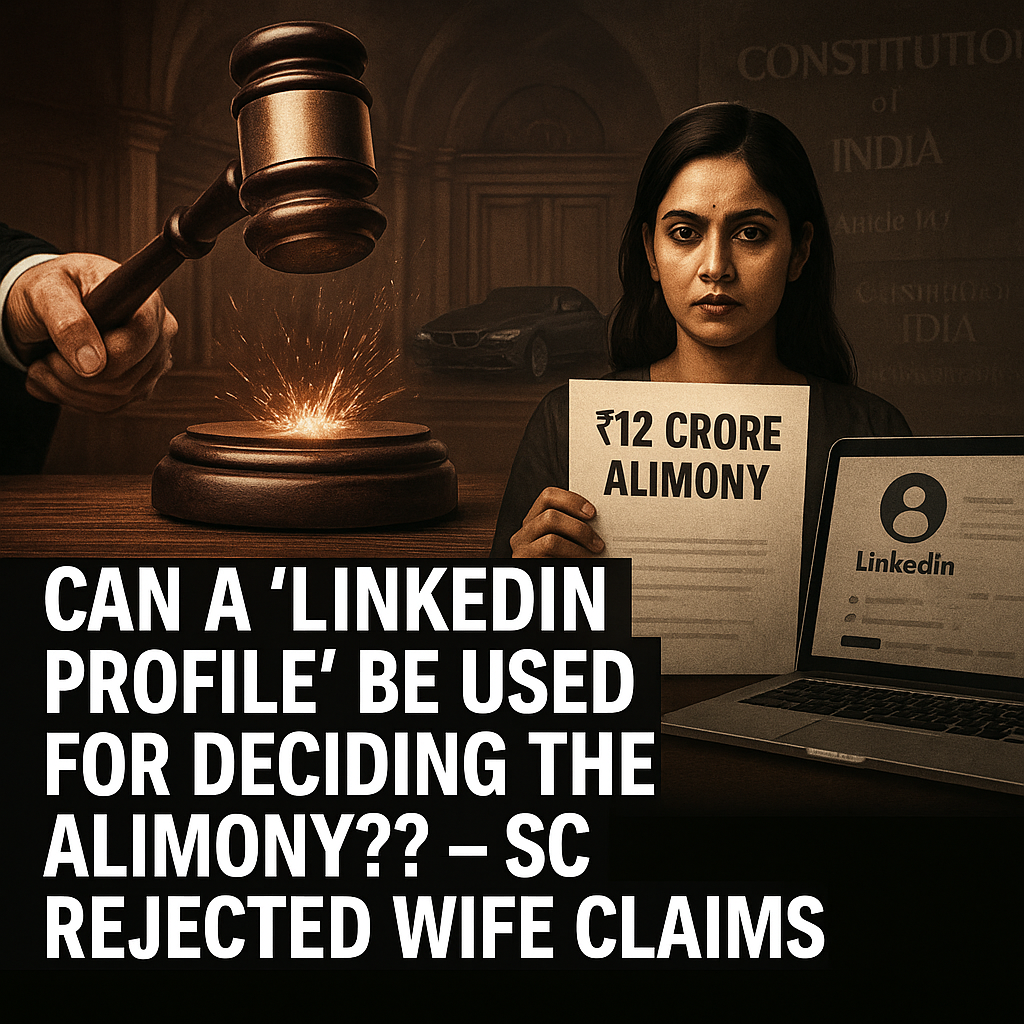Introduction
On Tuesday (5/08/2025) The supreme court used its extraordinary power under Article 142 of the constitution to dissolve the eight yearlong matrimonial disputes stating that the relationship is irreversible and “LinkedIn profile” was not a credible source of income verification. Earlier Apex Court dismissed the women’s claim for ₹12 crore in alimony and a luxury BMW car. At that time the case was widely discussed around the country.
Background of the Case
In 2017 the FIR was filed against the husband and in-laws by the wife alleging domestic violence against her. Later in 2022 wife signed the mutual settlement agreement under which she agreed on a Mumbai flat with Two parking spots. Both the husband and wife are well- qualified. The husband’s income has dropped from ₹2.5crore annually to ₹18lakh in recent years and the court also accepted it. But the wife relied on the “LinkedIn profile” of her husband and demanded ₹12 Crore and a BMW car. The wife also has a working history and graduated as Engineer and done post- Graduate in management. Court states that she was not in need of lifelong financial support
What Supreme Court held in this case?
The bench of Chief justice of India (CJI) BR Gavai, and justice K Vinod Chandaran and NV Anjaria Invoked its power under Article 142 of the Constitution to dissolve the marriage stating that the relationship is irreversible and also states that the “LinkedIn Profile” doesn’t work as corroborative evidence which can support the claim as it doesn’t show salary slips etc. The court emphasized that legal decision must be based on the verified documentation. Hence the demand of ₹12 crore and the luxury car BMW was dismissed as the alimony and The Mumbai flat with two parking spots is given to the wife as a full final settlement.
Court also gave the grounds for rejecting the recent claim of wife
1. In 2022 the wife has signed the mutual agreement in which she agreed on the Mumbai flat with two parking slots
2. The wife is unable to prove the income of his husband as she relies on the “LinkedIn Profile” of his husband
3. The wife is also well-educated and has done graduation in engineering and post-graduation in management and has working experience.
“There is no need of lifetime maintenance”- Court added
4. The recent demand will be a very big burden on the husband as he has to take care of his old aged parents and has an autistic child to support.
What is Article 142 of the Constitution?
Article 142 of the Indian Constitution empowers the Supreme Court with the extraordinary authority to deliver complete justice in any case before it. This means court can bypass the regular laws if they think that law will serve injustice. Article 142 is a vital tool for the supreme court to serve justice. Earlier Supreme Court has used Article 142 in landmark judgment on “Vishakha Guidelines” as there is no specific laws at that time to protect women from sexual harassment at workplace.
To sum up
The ruling of the Supreme Court in this case reinforces a crucial legal principle “Truth must be verified, not assumed” particularly in the matters which include large monetary funds. While a social platform like “LinkedIn profile” is used to showcase the experience and the credibility of the individual, it can’t be used as certified evidence in court of law. By using Article 142 of the Constitution the Court once again shows the balance and fair decision to serve complete justice
About the Author
Tushar Kumar is a final-year BBA-LLB student at Guru Gobind Singh Indraprastha University. With a strong interest in Intellectual Property Rights, he enjoys exploring how law interacts with innovation and creativity. He’s equally passionate about legal writing, Research and believes in making complex legal ideas easier to understand through clear articles. Tushar continues to deepen his understanding of the law while contributing thoughtful pieces on contemporary legal issues.

